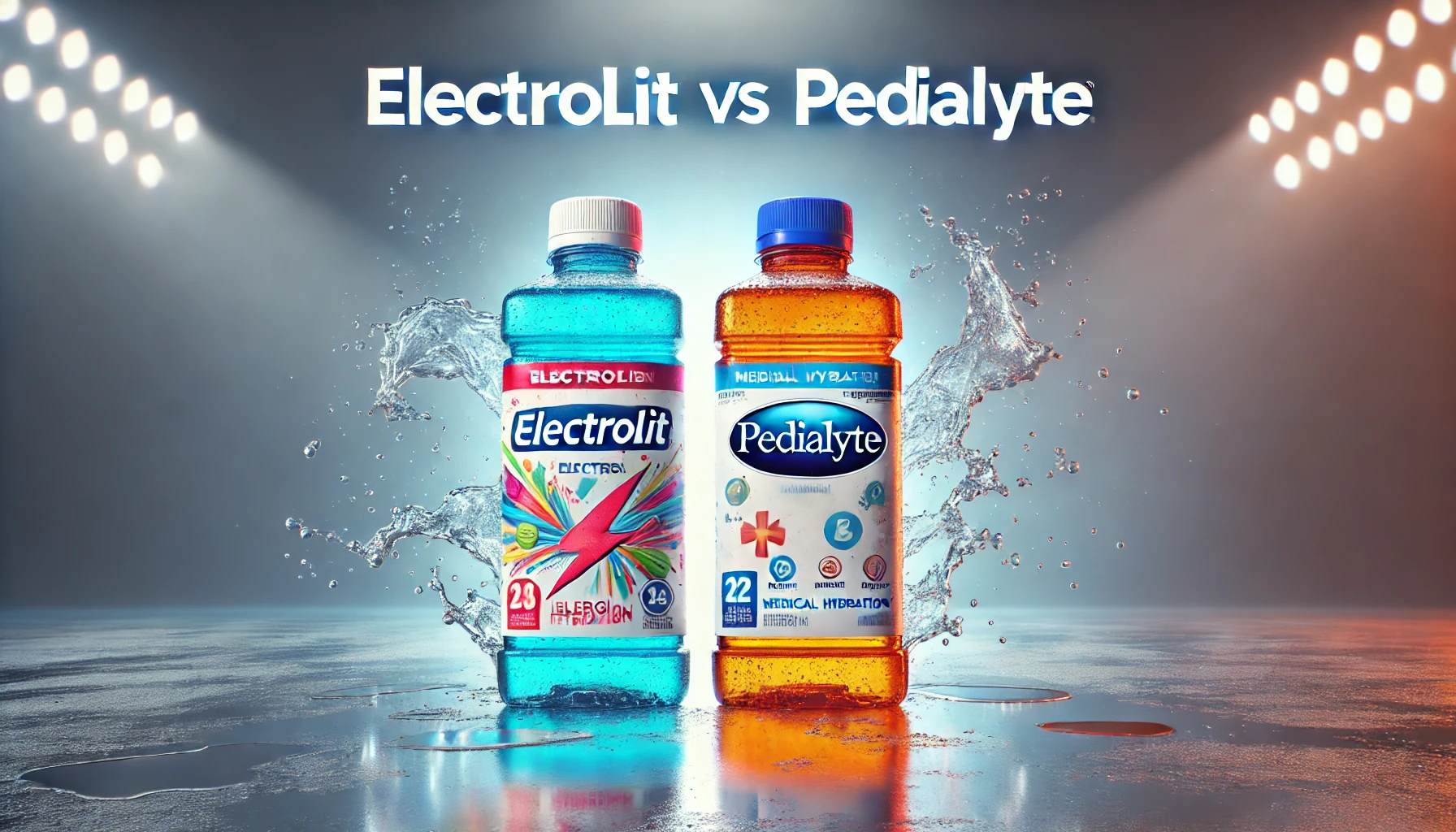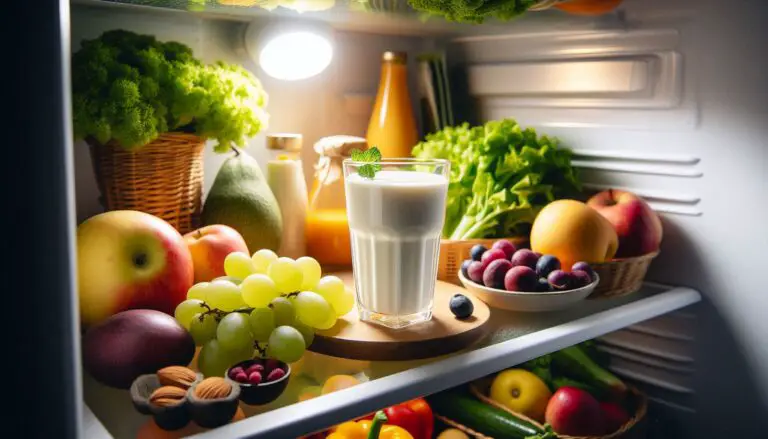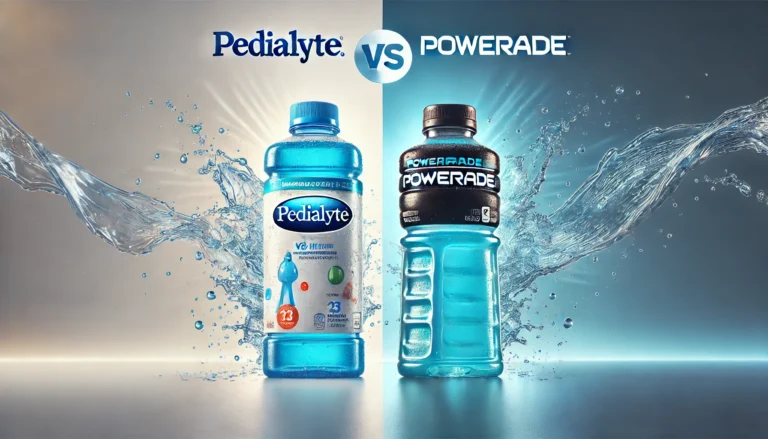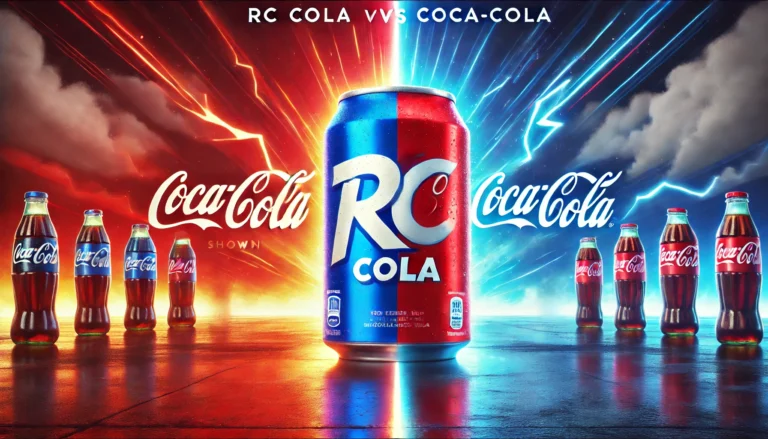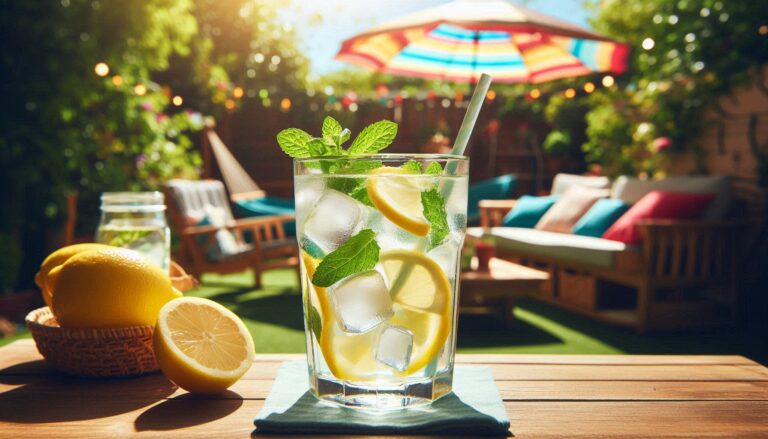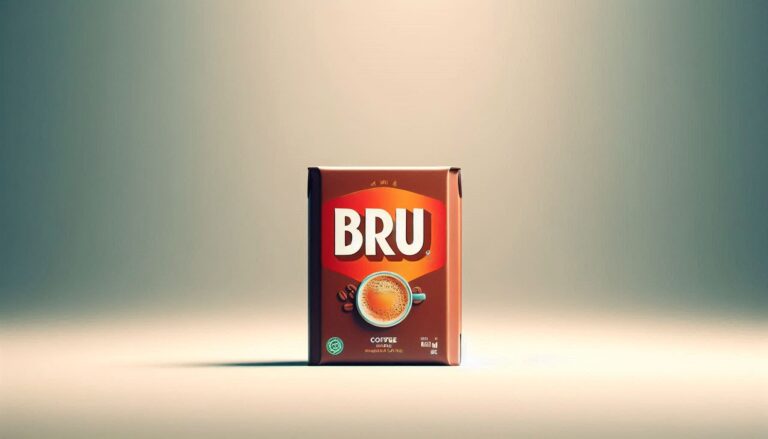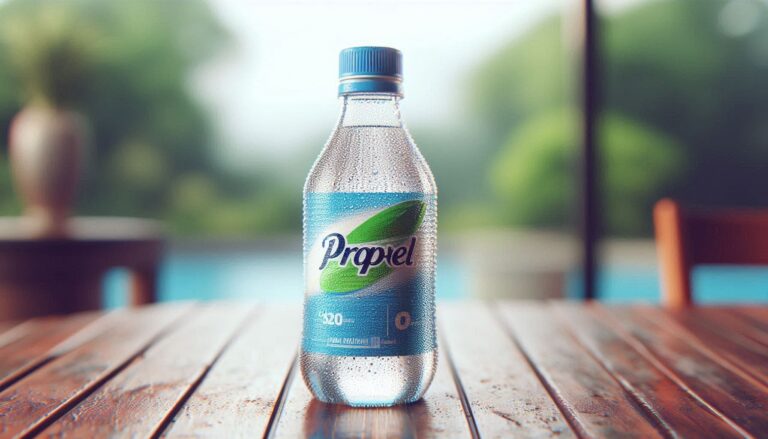Electrolit vs Pedialyte: Which Hydration Drink Is Better?
Proper hydration is crucial for maintaining good health, and electrolyte drinks play a significant role in replenishing lost fluids and minerals. Electrolit vs Pedialyte is a common debate when choosing the right hydration solution, especially for dehydration due to illness, exercise, or heat exposure. Both drinks offer unique benefits, but which one is best suited to your needs?
What Are Electrolit and Pedialyte?
Electrolit
- Overview: Founded in 1950 in Mexico, Electrolit is a hydration drink designed for quick recovery from dehydration, targeting athletes and active individuals.
- Common Uses: Ideal for post-workout recovery, rehydration after heat exposure, and combating dehydration from minor illnesses or hangovers.
Pedialyte
- Overview: Introduced in 1966 by Abbott Laboratories, Pedialyte is a medical-grade hydration solution originally for children, now widely used by adults.
- Common Uses: Helps with rehydration during illness, after exercise, or for hangover recovery, offering a low-sugar, balanced option for all ages.
Ingredients and Nutritional Comparison (1) (2)
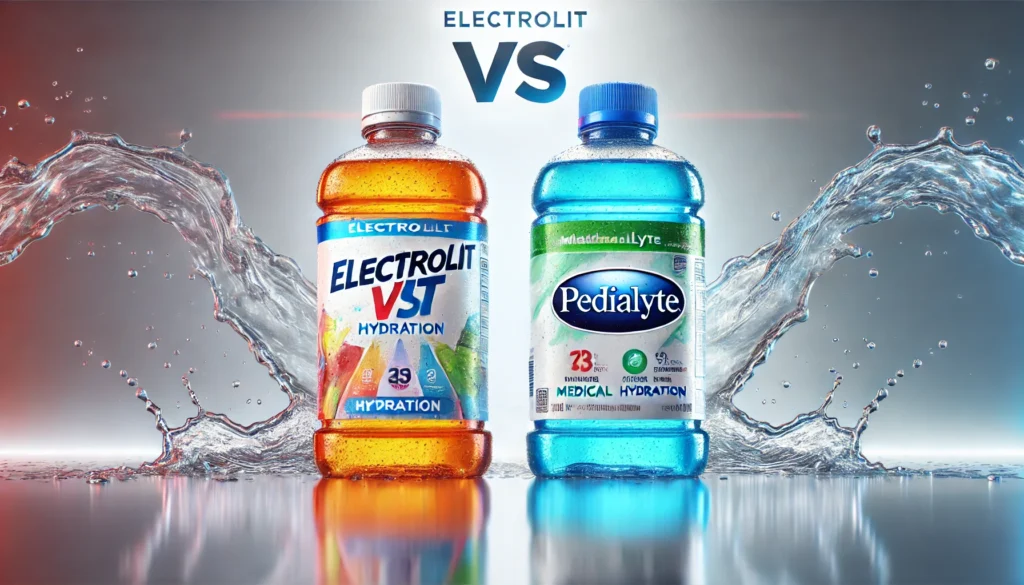
Electrolit Flavors
1. Lemon
Ingredients:
- Water
- Dextrose Monohydrate
- Contains 2% or less of:
- Sodium Lactate
- Citric Acid
- Potassium Chloride
- Molasses
- Natural Lemon-Lime Flavor
- Magnesium Chloride
- Citric Flavor
- Calcium Chloride
- Salt
- Steviol Glycosides
Nutritional Information (per 12 fl oz serving container):
| Nutrient | Per Serving (12 fl oz) | Per Container |
|---|---|---|
| Calories | 70 | 130 |
| Total Fat | 0g (0%) | 0g (0%) |
| Sodium | 250mg (11%) | 430mg (19%) |
| Total Carbohydrate | 18g (6%) | 31g (11%) |
| Total Sugars | 18g | 31g |
| Incl. Added Sugars | 18g (36%) | 31g (62%) |
| Protein | 0g | 0g |
| Calcium | 29mg (2%) | 51mg (4%) |
| Potassium | 280mg (6%) | 487mg (10%) |
| Magnesium | 17mg (4%) | 29mg (7%) |
Additional Note:
“Not a significant source of saturated fat, trans fat, cholesterol, dietary fiber, vitamin D, or iron.”
2. Orange
Ingredients:
- Water
- Dextrose Monohydrate
- Contains 2% or less of:
- Sodium Lactate
- Natural Orange Flavor
- Citric Acid
- Potassium Chloride
- Molasses
- Magnesium Chloride
- Calcium Chloride
- Salt
- Steviol Glycosides
- FD&C Yellow No. 6
Nutritional Information (per 12 fl oz [360 mL] serving):
image:
| Nutrient | Per Serving (12 fl oz) | Per Container |
|---|---|---|
| Calories | 70 | 130 |
| Total Fat | 0g (0%) | 0g (0%) |
| Sodium | 250mg (11%) | 430mg (19%) |
| Total Carbohydrate | 18g (6%) | 31g (11%) |
| Total Sugars | 18g | 31g |
| Incl. Added Sugars | 18g (36%) | 31g (62%) |
| Protein | 0g | 0g |
| Calcium | 29mg (2%) | 51mg (4%) |
| Potassium | 280mg (6%) | 487mg (10%) |
| Magnesium | 17mg (4%) | 29mg (7%) |
Additional Note:
“Not a significant source of saturated fat, trans fat, cholesterol, dietary fiber, vitamin D, or iron.”
- Magnesium (Mg): Helps avoid cramps.
- Potassium (K): Helps avoid muscle spasms.
- Calcium (Ca): Aids metabolic processes.
- Sodium-Glucose: Facilitates hydration.
- Sodium Lactate: Helps prevent acid buildup.
The beverage is sweetened with natural glucose, molasses, and steviol glycosides, and is gluten-free.
3. Strawberry
Ingredients:
- Purified Water
- Dextrose Monohydrate
- Less than 2% of:
- Sodium Lactate
- Potassium Chloride
- Citric Acid
- Natural Strawberry Flavor
- Molasses
- Magnesium Chloride
- Calcium Chloride
- Malic Acid
- Steviol Glycosides (Stevia)
- Salt
- FD&C Red No. 40
Note: The ingredient list is based on available information and may vary slightly depending on the source.
Nutritional Information (per 12 fl oz serving):
image:
| Nutrient | Per Serving (12 fl oz) | Per Container |
|---|---|---|
| Calories | 70 | 130 |
| Total Fat | 0g (0%) | 0g (0%) |
| Sodium | 250mg (11%) | 430mg (19%) |
| Total Carbohydrate | 18g (6%) | 31g (11%) |
| Total Sugars | 18g | 31g |
| Incl. Added Sugars | 18g (36%) | 31g (62%) |
| Protein | 0g | 0g |
| Calcium | 29mg (2%) | 51mg (4%) |
| Potassium | 280mg (6%) | 487mg (10%) |
| Magnesium | 17mg (4%) | 29mg (7%) |
Additional Note:
“Not a significant source of saturated fat, trans fat, cholesterol, dietary fiber, vitamin D, or iron.”
Pedialyte Flavors
1. Pedialyte® Classic Grape
Ingredients:
Water, Dextrose. Less than 0.5% of: Citric Acid, Potassium Citrate, Salt, Natural and Artificial Flavor, Sodium Citrate, Sucralose, Acesulfame Potassium, Zinc Gluconate, Red 40, and Blue 1.
Nutritional Information (per 12 fl oz/360 mL):
| Nutrient | Amount per Serving | % Daily Value* |
|---|---|---|
| Calories | 25 | — |
| Total Fat | 0 g | 0% |
| Sodium | 390 mg | 17% |
| Potassium | 280 mg | 6% |
| Total Carbohydrate | 7 g | 3% |
| Total Sugars | 5 g | — |
| Added Sugars | 5 g | 10% |
| Protein | 0 g | — |
| Zinc | 2.8 mg | 25% |
| Chloride | 440 mg | 20% |
*Percent Daily Values (DV) are based on a 2,000-calorie diet. Not a significant source of saturated fat, trans fat, cholesterol, dietary fiber, vitamin D, calcium, and iron.
2. Pedialyte® Classic Strawberry
Ingredients:
Water, Dextrose. Less than 0.5% of: Citric Acid, Potassium Citrate, Salt, Sodium Citrate, Natural Flavor, Sucralose, Acesulfame Potassium, Zinc Gluconate, Red 40, and Blue 1.
Nutritional Information (per 12 fl oz/360 mL):
| Nutrient | Amount per Serving | % Daily Value* |
|---|---|---|
| Calories | 25 | — |
| Total Fat | 0 g | 0% |
| Sodium | 390 mg | 17% |
| Potassium | 280 mg | 6% |
| Total Carbohydrate | 7 g | 3% |
| Total Sugars | 5 g | — |
| Added Sugars | 5 g | 10% |
| Protein | 0 g | — |
| Zinc | 2.8 mg | 25% |
| Chloride | 440 mg | 20% |
*Percent Daily Values (DV) are based on a 2,000-calorie diet. Not a significant source of saturated fat, trans fat, cholesterol, dietary fiber, vitamin
Flavor Options and Taste
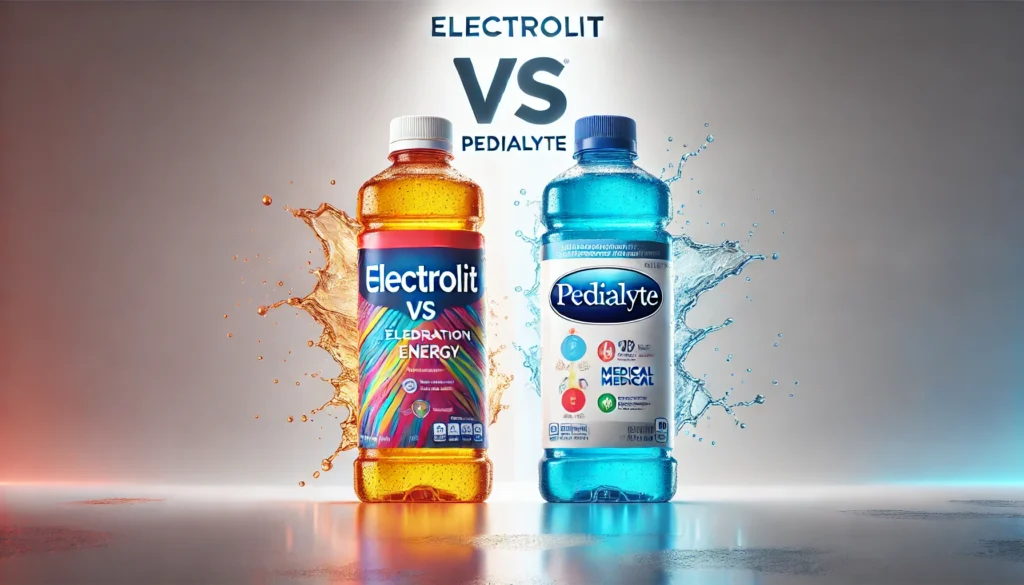
Electrolit
Available Flavors:
- Lemon
- Orange
- Strawberry
- Tropical
Taste Description:
- Lemon: Refreshing with a tangy citrus punch, not overly sweet, and provides a clean, sharp taste that’s easy to drink after exercise.
- Orange: A classic citrus flavor, slightly sweet with a mild tang, balancing the natural fruitiness with hydration-focused electrolytes.
- Strawberry: Sweet with a fruity, berry-forward taste, and a subtle tartness to balance the sweetness, making it a fan favorite.
- Tropical: A blend of various tropical fruits, offering a sweet, exotic flavor with hints of pineapple and coconut, providing a fun and sweet hydration option.
Overall Taste Profile:
Electrolit flavors tend to be sweet but not overwhelmingly so. The balance between flavor and hydration makes them appealing to athletes or individuals looking for a refreshing electrolyte drink. While sweet, they maintain a level of tanginess that keeps the flavors vibrant but not overpowering.
Pedialyte
Classic Flavors:
- Fruit Punch
- Grape
- Strawberry
- Apple
- Lemonade
Advanced Flavors:
- Pedialyte AdvancedCare+: Available in flavors like Fruit Punch, Tropical, and Grape, featuring a higher concentration of electrolytes and added zinc for immune support.
- Pedialyte Organic: Available in Organic Fruit Punch and Organic Tropical flavors, formulated with organic ingredients and lower sugar.
Taste Insights:
- Fruit Punch: A smooth and familiar sweet taste with fruity, slightly tart undertones. It’s generally liked for being refreshing but not overly sugary.
- Grape: Bold and sweet, with a rich, fruity flavor that balances well with the drink’s electrolytes. Some people find it a bit sweet for their taste.
- Strawberry: Sweet and juicy with a mild, pleasant flavor that is not too overpowering. It’s an approachable option for people who enjoy berry flavors.
- Apple: Light and crisp, with a tangy sweetness that feels refreshing without being too rich or heavy.
- Lemonade: Slightly tart and citrusy, it has a classic lemonade flavor that’s both sweet and tangy, providing a very refreshing taste.
Advanced Flavors:
- Pedialyte AdvancedCare+: These flavors are similar to the classic ones but with a slightly stronger flavor profile due to the increased electrolytes and added zinc, which can give them a slightly more medicinal aftertaste.
- Pedialyte Organic: These tend to have a more natural and less sugary taste, with a more subtle flavor overall compared to the classic variants.
Taste Differences:
- Regular Pedialyte tends to have a more neutral and mild flavor with a focus on hydration and recovery. The sweetness is moderate, and the flavors are subtle.
- Pedialyte AdvancedCare+ features a stronger electrolyte concentration and can sometimes taste a little saltier or slightly more medicinal due to the additional electrolytes and zinc.
- Pedialyte Organic offers a lighter, less sweet taste with a more natural flavor profile. These are less sugary and can appeal to those looking for a more health-conscious option.
Pros and Cons
Electrolit
Pros:
- Great for Athletes: Designed with an optimal balance of key electrolytes like sodium, potassium, magnesium, and calcium, making it ideal for rehydration during or after intense physical activity.
- Flavorful: Offers a wide range of tasty flavors (like Lemon, Orange, and Strawberry), making it a more enjoyable choice for those looking for a hydrating drink with a pleasant taste.
- Good Electrolyte Balance: Provides the necessary electrolytes to help replenish what is lost during physical exertion, sweating, or heat exposure.
Cons:
- Might Be Too Sweet for Some: The flavors can be on the sweeter side, which may not be ideal for people who prefer a less sugary taste or those trying to reduce their sugar intake.
- Higher Sugar Content: Contains around 15-20 grams of sugar per serving, which may be a concern for individuals looking for low-sugar or sugar-free hydration options.
Pedialyte
Pros:
- Medical-Grade Hydration: Pedialyte is formulated to meet the needs of medical rehydration, making it effective for those recovering from illness, dehydration, or stomach-related issues.
- Suitable for All Ages: Originally designed for children, but now widely used by adults and even athletes, making it a versatile hydration solution for the whole family.
- Low Sugar in Some Variants: Certain Pedialyte options, such as the Organic Pedialyte, contain lower sugar content, making it a good option for those conscious of sugar intake.
Cons:
- Limited Flavors in Some Regions: While Pedialyte offers a variety of flavors, availability can be limited depending on the region or the specific variant (e.g., Organic or AdvancedCare+).
- Higher Price for Advanced Formulas: Pedialyte AdvancedCare+ and Organic variants tend to be pricier compared to the regular Pedialyte, which may not be cost-effective for everyone.
Which One Should You Choose?
When deciding between Electrolit and Pedialyte, the right choice depends on your specific needs and preferences. Here’s a breakdown of factors to consider:
1. Hydration Needs
- For Workout Recovery:
Electrolit is an excellent choice for athletes or anyone engaging in intense physical activity. Its higher sugar content and balanced electrolytes (sodium, potassium, magnesium, and calcium) make it effective for replenishing electrolytes lost during exercise. Its sweeter taste and fruity flavors are more appealing post-workout when you’re looking for a refreshing drink. - For Illness Recovery:
Pedialyte is formulated for medical-grade hydration, making it ideal for recovery from illness or dehydration due to conditions like vomiting, diarrhea, or fever. Its lower sugar content and higher electrolyte concentration make it a reliable option for restoring hydration and supporting your body’s recovery process. If you’re recovering from illness, Pedialyte’s gentle formula is ideal for children, adults, and anyone with sensitive stomachs.
2. Taste Preferences
- If You Prefer Sweeter Flavors:
Electrolit is the better choice. With vibrant and bold flavors like Strawberry, Tropical, and Lemon, it’s a great option if you enjoy a sweet and refreshing taste while hydrating. - If You Prefer Milder or Less Sweet Flavors:
Pedialyte might be more appealing. While it still offers fruit-forward flavors like Fruit Punch, Grape, and Strawberry, its taste is generally milder and less sugary, which may be preferable for those who find sweeter drinks too overpowering.
3. Budget and Availability
- For Budget-Conscious Consumers:
Electrolit tends to be more affordable compared to Pedialyte, making it a better choice if you’re looking for a cost-effective hydration drink for regular use (especially for athletes or active individuals). It is also widely available at many sports stores, grocery stores, and online. - For Those Willing to Spend a Little More for Specialized Hydration:
Pedialyte may be the right choice if you prioritize medical-grade hydration. Although it’s a bit pricier, especially for its AdvancedCare+ and Organic variants, its effectiveness for illness recovery and balanced electrolyte formula make it worth the investment for specific hydration needs. Plus, Pedialyte is available in pharmacies, making it easy to find when you need it most.
4. Medical or Fitness Focus
- For Fitness or Active Lifestyles:
Electrolit is specifically designed to support active individuals, athletes, and those who regularly engage in physical activity. It provides quick recovery with its blend of electrolytes and energy-boosting sugars, making it an excellent choice for workouts or strenuous physical exertion. - For Medical or Illness Recovery:
Pedialyte excels in situations where medical-grade hydration is necessary, such as during illness, dehydration due to food poisoning, or after excessive alcohol consumption. It’s gentle on the stomach and supports faster recovery with a higher concentration of electrolytes.
Conclusion
In conclusion, both Electrolit and Pedialyte are effective hydration solutions, but they cater to slightly different needs and preferences. Electrolit is ideal for athletes and active individuals seeking a flavorful and quick rehydration solution, especially after workouts or heat exposure. Its vibrant flavors and balanced electrolyte profile make it a go-to for fitness enthusiasts. On the other hand, Pedialyte is better suited for medical-grade hydration, making it a reliable option for recovery from illness, dehydration, or sensitive stomachs. Its milder taste, lower sugar options, and targeted formulas provide versatility for all ages. Ultimately, the choice depends on your hydration goals, taste preferences, and specific circumstances. Both drinks deliver on their promise to rehydrate effectively, leaving you refreshed and revitalized.
